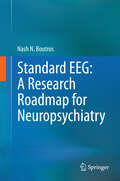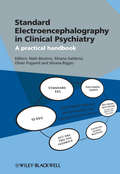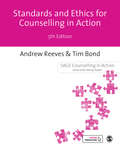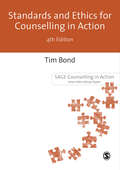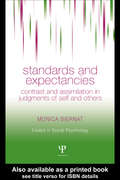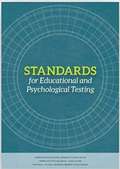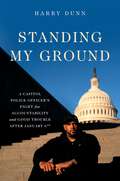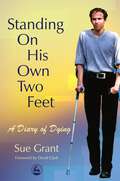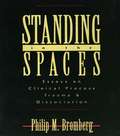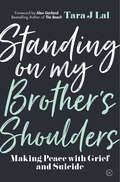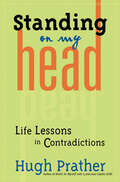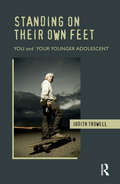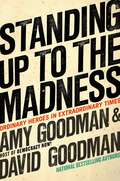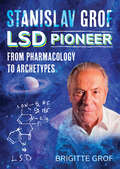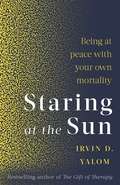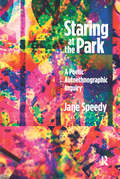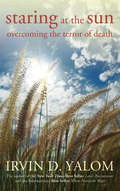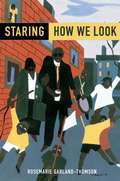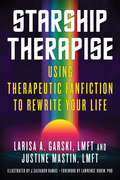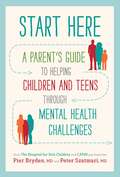- Table View
- List View
Stand by Me: The Risks and Rewards of Mentoring Today's Youth (The Family and Public Policy #2)
by Jean E. RhodesA child at loose ends needs help, and someone steps in--a Big Brother, a Big Sister, a mentor from the growing ranks of volunteers offering their time and guidance to more than two million American adolescents. Does it help? How effective are mentoring programs, and how do they work? Are there pitfalls, and if so, what are they? Such questions, ever more pressing as youth mentoring initiatives expand their reach at a breakneck pace, have occupied Jean Rhodes for more than a decade. In this provocative, thoroughly researched, and lucidly written book, Rhodes offers readers the benefit of the latest findings in this burgeoning field, including those from her own extensive, groundbreaking studies. Outlining a model of youth mentoring that will prove invaluable to the many administrators, caseworkers, volunteers, and researchers who seek reliable information and practical guidance, Stand by Me describes the extraordinary potential that exists in such relationships, and discloses the ways in which nonparent adults are uniquely positioned to encourage adolescent development. Yet the book also exposes a rarely acknowledged risk: unsuccessful mentoring relationships--always a danger when, in a rush to form matches, mentors are dispatched with more enthusiasm than understanding and preparation--can actually harm at-risk youth. Vulnerable children, Rhodes demonstrates, are better left alone than paired with mentors who cannot hold up their end of the relationships. Drawing on work in the fields of psychology and personal relations, Rhodes provides concrete suggestions for improving mentoring programs and creating effective, enduring mentoring relationships with youth.
Standard EEG: A Research Roadmap for Neuropsychiatry
by Nash N. BoutrosThis volume is designed to serve as a reference source containing both historical and recent references with a special focus on the existing gaps of knowledge regarding EEG deviations in psychiatric populations. Every chapter begins by outlining the clinical issues, then reviews available literature and concludes by highlighting a) currently supportable findings, and b) open research questions. In some chapters the author makes suggestions regarding the research design that will most likely lead to generating data that can move the field towards resolving unresolved issues.
Standard EEG: A Research Roadmap for Neuropsychiatry
by Nash N. BoutrosThis volume is designed to serve as a reference source containing both historical and recent references with a special focus on the existing gaps of knowledge regarding EEG deviations in psychiatric populations. Every chapter begins by outlining the clinical issues, then reviews available literature and concludes by highlighting a) currently supportable findings, and b) open research questions. In some chapters the author makes suggestions regarding the research design that will most likely lead to generating data that can move the field towards resolving unresolved issues.
Standard Electroencephalography in Clinical Psychiatry
by Silvana Galderisi Oliver Pogarell Silvana Riggio Nash BoutrosThis book provides a concise overview of the possible clinical applications of standard EEG in clinical psychiatry. After a short history, the book describes the physiologic basis of the EEG signal, then reviews the principles of EEG in terms of technical backgrounds and requirements, EEG recording and signal analysis, with plentiful illustrations of the most frequent biological or technical artefacts. Normal EEG patterns and waveforms for easy reference are clearly presented, before the detailed description of abnormal patterns.With the basic information in hand, the reader progresses to an account of the role of EEG in the diagnostic work up in psychiatry, covering nonconvulsive status epilepticus, frontal lobe seizures and non-epileptic seizures. The clinical application of EEG in both childhood and adult disorders follows, including many case vignettes. The effects of psychotropic drugs on EEG are highlighted.The book closes with a discussion of currently available certification venues for Clinical Neurophysiology along with limitations of each venue. It calls for the development of training guidelines and certification processes specific to Psychiatric Electrophysiology.The material is clearly presented throughout, with plenty of figures, tables with summaries of relevant findings, flow diagrams for diagnostic work-up, boxes with learning points, and short lists of key references.We fully expect the book will become the standard teaching source for psychiatry residents and fellows, as well as a useful resource for practising psychiatrists and clinical psychologists.Praise for the book:"This distinguished group of editors has put together chapters that represent an excellent practical handbook on electroencephalography in clinical psychiatry, now a very important topic. I highly recommend it not only to psychiatrists, but also to anyone interested in neuroscience."John R. Hughes, DM (Oxon), MD, PhD, Professor of Neurology, University of Illinois Medical Center, at Chicago, Illinois, USA
Standard Electroencephalography in Clinical Psychiatry: A Practical Handbook
by Nash N. Boutros Silvana Galderisi Oliver Pogarell Silvana RiggioThis book provides a concise overview of the possible clinical applications of standard EEG in clinical psychiatry. After a short history, the book describes the physiologic basis of the EEG signal, then reviews the principles of EEG in terms of technical backgrounds and requirements, EEG recording and signal analysis, with plentiful illustrations of the most frequent biological or technical artefacts. Normal EEG patterns and waveforms for easy reference are clearly presented, before the detailed description of abnormal patterns. With the basic information in hand, the reader progresses to an account of the role of EEG in the diagnostic work up in psychiatry, covering nonconvulsive status epilepticus, frontal lobe seizures and non-epileptic seizures. The clinical application of EEG in both childhood and adult disorders follows, including many case vignettes. The effects of psychotropic drugs on EEG are highlighted. The book closes with a discussion of currently available certification venues for Clinical Neurophysiology along with limitations of each venue. It calls for the development of training guidelines and certification processes specific to Psychiatric Electrophysiology. The material is clearly presented throughout, with plenty of figures, tables with summaries of relevant findings, flow diagrams for diagnostic work-up, boxes with learning points, and short lists of key references. We fully expect the book will become the standard teaching source for psychiatry residents and fellows, as well as a useful resource for practising psychiatrists and clinical psychologists. Praise for the book: "This distinguished group of editors has put together chapters that represent an excellent practical handbook on electroencephalography in clinical psychiatry, now a very important topic. I highly recommend it not only to psychiatrists, but also to anyone interested in neuroscience." John R. Hughes, DM (Oxon), MD, PhD, Professor of Neurology, University of Illinois Medical Center, at Chicago, Illinois, USA
Standards Ethics for Counselling in Action (Counselling in Action series)
by Tim Bond Andrew ReevesThis is your essential guide to standards and ethics in the psychological therapies. The book introduces you to key ethical values and principles and discusses how to practice in accordance with these. An accompanying online resource website provides you with over 30 videos showing commonly arising ethical dilemmas, further reading including book chapters and journal articles, and links to ethical codes and frameworks in the UK and internationally.
Standards Ethics for Counselling in Action (Counselling in Action series)
by Tim Bond Andrew ReevesThis is your essential guide to standards and ethics in the psychological therapies. The book introduces you to key ethical values and principles and discusses how to practice in accordance with these. An accompanying online resource website provides you with over 30 videos showing commonly arising ethical dilemmas, further reading including book chapters and journal articles, and links to ethical codes and frameworks in the UK and internationally.
Standards and Ethics for Counselling in Action
by Tim BondSAGE celebrated the 20th Anniversary of the Counselling in Action in November 2008. To view the video - click here ------------------------------------------------------ 'This book is very comprehesive and a useful addition to the reading list for healthcare students' 'Excellent student text' 'Invaluable text' `This edition retains the same informative and accessible style and broadly the same order of contents as the First Edition, which makes it easy for readers to track down key changes. The author's extensive experience in the field of ethics in counselling and his experience as Chair of BACP underpin this updated, essential and authoritative Second Edition' - British Journal of Guidance and Counselling 'Tim Bond has done a great service to the counselling profession by writing, and now updating, this book… His particular strength must surely be his clarity in acquainting counsellors with the complexities of British law. After an introduction, he starts with an exploration of the origins and scope of counselling. He then exemplifies cases in which a counsellor's personal and professional values collide. He has collected together a host of ethical dilemmas that counsellors might have to face' - Naomi Stadlen, Journal of the Society for Existential Analysis This highly acclaimed guide to the major responsibilities which trainees and counsellors in practice must be aware of before working with clients has now been fully revised and updated. The Second Edition examines issues fundamental to the process of counselling. A wide range of ethical problems are discussed and advice is given for resolving these dilemmas. Tim Bond outlines the values and ethical principles inherent in counselling and points out that the counsellor is at the centre of a series of responsibilities: to the client, to him/herself as a counsellor and to the wider community. He covers topics such as: confidentiality; legal aspects of counselling; working with suicidal clients; false or recovered memory; record- keeping; and the importance of adequate supervision.
Standards and Ethics for Counselling in Action (Counselling in Action series)
by Tim BondGet 24 months FREE access to an interactive eBook* when you buy the paperback! (Print paperback version only, ISBN9781473913974) To find out more visit: https://study.sagepub.com/counsellingethics Textbook with free access to counselling videos and other digital resources! The fourth edition of this classic text includes FREE access to an interactive eBook edition, which gives you on-the-go access to a wealth of digital resources supporting the print edition. It includes: · 16 counselling scenario videos · 16 author discussion videos · an interactive glossary · journal articles · interactive multiple choice questions · live links to useful websites, including ethical codes and frameworks relevant to the UK and internationally. The 16 counselling scenario videos illustrate key ethical topics, issues and dilemmas arising in counselling practice, including: contracting, confidentiality, working with a client with suicidal intent, counselling in a digital age, counsellor self-care - and much more. In the 16 author discussion videos, leading expert Tim Bond gives his reflections on each counselling scenario, to support you in your ethical practice. Other updates to the new edition include three new chapters on Working with Social Diversity, Counselling in a Digital Age and Being Accountable: Evidence-based Practice and Monitoring and new content on reflective practice to encourage ethical mindfulness. This is the ultimate guide to standards and ethics in the psychological therapies and a must read for all trainees and practitioners. Tim Bond is an Emeritus Professor of the University of Bristol and Visiting Professor to the University of Malta. We are putting the finishing touches on all of the carefully crafted tools and resources that will soon be available to you on the interactive ebook. Please check back soon to see what the interactive ebook has to offer! *interactivity only available through Vitalsource eBook 9781473913974
Standards and Expectancies: Contrast and Assimilation in Judgments of Self and Others (Essays in Social Psychology)
by Monica BiernatThis book examines how standards and expectancies affect judgments of others and the self. Standards are points of comparison, expectancies are beliefs about the future, and both serve as frames of reference against which current events and people (including the self) are experienced. The central theme of the book is that judgments can be characterized as either assimilative or contrastive in nature. Assimilation occurs when the target of evaluation (another person, the self) is pulled toward or judged consistently with the standard or expectation, and contrast occurs when the target is differentiated from (judged in a direction opposite) the comparative frame. The book considers factors that determine whether assimilation versus contrast occurs, and focuses on the roles of contextual cues, the self, and stereotypes as standards for judging others, and the roles of internalized guides, stereotypes, and other people for judging the self.
Standards for Educational and Psychological Testing
by American Educational Research Association American Psychological Assocation National Council on Measurement in EducationThese testing standards are a product of the American Educational Research Association, the American Psychological Association (APA), and the National Council on Measurement in Education (NCME). Published collectively by the three organizations since 1966, it represents the gold standard in guidance on testing in the United States and in many other countries.
Standing My Ground: A Capitol Police Officer's Fight for Accountability and Good Trouble After January 6th
by Harry DunnNew York Times Bestseller The stirring memoir of Harry Dunn, a Capitol Police Officer on duty January 6th, who has become one of the most prominent and essential voices regarding the truth of that day, and &“a must-read for those care about our nation&’s future&” (Congressman Eric Swalwell). Walking the halls of democracy as a Capitol Police officer, Harry Dunn was a man slowly experiencing an awakening. It sparked after the election of our first Black president. It grew as his belief in the bravery and honor of law enforcement was shaken by Ferguson and countless other cases of police brutality towards the Black community. It continued to burn brighter as he watched members of Congress, many of whom he had befriended, lose their way to partisanship, as political extremism intensified. And it exploded into a blaze when he fought side by side with his fellow officers on January 6th, when democracy and their lives were threatened.Standing My Ground is &“a powerful, patriotic tale – told with striking moral clarity&” (Congresswoman Nancy Pelosi) that provides a crucial, definitive firsthand account of what happened on that day our country was shocked to its core. But it will also share the story of a man who refused to stay quiet when he learned that some of the men and women he had risked his life protecting, who knew him by name, would deny the horrors they faced. That&’s when he chose to speak up and to seek out what his hero John Lewis once termed &“good trouble.&” Dunn&’s ongoing story as a witness willing to meaningfully engage with the media, lawmakers, and the public provides a backdrop for examining the political and racial divide in this country—one that we must overcome in order to demand accountability and preserve our precious democracy.
Standing On His Own Two Feet: A Diary of Dying
by Sue GrantAlexander had just begun his studies at university when he was diagnosed with a rare bone cancer. In this honest account, Alex's mother traces the impact of the diagnosis on the whole family and outlines the issues that arose during diagnosis, treatment and terminal stages of her son's illness. Standing on His Own Two Feet offers an insight into how health care systems serve the terminally ill, the choices faced by families, and ways of providing the best possible care at home and maintaining the patient's dignity until the end. In particular, Sue Grant deals sensitively with the care needs of young adults. Portraying a family of admirable resilience and strength, this inspiring and moving book offers support and practical tips for anybody encountering terminal illness and presents valuable discussion points for all nursing, health and social care professionals.
Standing in the Spaces: Essays on Clinical Process Trauma and Dissociation
by Philip M. BrombergEarly in these essays, Bromberg contemplates how one might engage schizoid detachment within an interpersonal perspective. To his surprise, he finds that the road to the patient's disavowed experiences most frequently passes through the analyst's internal conversation, as multiple configurations of self-other interaction, previously dissociated, are set loose first in the analyst and then played out in the interpersonal field. This insight leads to other discoveries. Beneath the dissociative structures seen in schizoid patients, and also in other personality disorders, Bromberg regularly finds traumatic experience -- even in patients not otherwise viewed as traumatized. This discovery allows interpersonal notions of psychic structure to emerge in a new light, as Bromberg arrives at the view that all severe character pathology masks dissociative defenses erected to ward off the internal experience of trauma and to keep the external world at bay to avoid retraumatization. These insights, in turn, open to a new understanding of dissociative processes as intrinsic to the therapeutic process per se. For Bromberg, it is the unanticipated eruption of the patient's relational world, with its push-pull impact on the analyst's effort to maintain a therapeutic stance, that makes possible the deepest and most therapeutically fruitful type of analytic experience. Bromberg's essays are delightfully unpredictable, as they strive to keep the reader continually abreast of how words can and cannot capture the subtle shifts in relatedness that characterize the clinical process. Indeed, at times Bromberg's writing seems vividly to recreate the alternating states of mind of the relational analyst at work. Stirringly evocative in character and radiating clinical wisdom infused with compassion and wit, Standing in the Spaces is a classic destined to be read and reread by analysts and therapists for decades to come.
Standing on My Brother's Shoulders: Making Peace with Grief and Suicide - A True Story
by Tara LalEverything finds its place, just as the colour and the beauty do, so does the pain. Tara Lal's childhood was battered by her father's mental illness and by her mother's death when she was thirteen. Caught up in grief and despair, she developed a deep, caring bond with her charismatic and kind older brother Adam, though he struggled silently with growing anxiety and depression. Four years after their mother's death, Adam committed suicide. Grief and insecurity threatened to engulf Tara, but eventually she found, through a dialogue with the words her brother left behind in his diaries, her reason to live. The book includes an Afterword on the possibilities for recovery and growth following a tragedy, written by Miriam Akhtar, author of Positive Psychology for Overcoming Depression.From the Trade Paperback edition.
Standing on My Head: Life Lessons in Contradictions
by Hugh PratherTidbits of Truth Guaranteed to Make You ThinkBest-selling author and counselor Hugh Prather demonstrates how a subtle shift in perspective can change your line of thinking—for the better.Intensely personal and universal. Lessons learned in life most often come from experience, our own or that of others. In this little volume by Hugh Prather, we dive into life lessons that stem from Prather’s personal experiences and encounters that can be applied universally. From mundane recollections to aphorisms and mantras, Prather examines things from a point of view that is both enlightening and refreshing. No matter where you are in your life journey, this book is packed with motivational thoughts that can lead to growth and change.Perceive something different—about yourself and others. A simple shift in perspective can go a long way toward adapting our thinking and bringing about personal transformation. Prather introduces various phrases throughout his book that carry a great truth in a simple way—such as, “"I have to act the way I am before I can become something else." By calling on us to examine these little truths in a different light, we can more easily see how they apply to our own lives and the lives of those around us.Learn more about:Yourself—this book promises an ongoing journey of self-discoveryHow a shift in thinking can change your lifeUniversal life-lesson quotes that you can turn to again and againIf you enjoyed books like Heart Talk, The Mindful Life Journal, or The Gifts of Imperfection then you’ll love Standing on My Head by Hugh Prather.
Standing on their Own Feet: You and Your Younger Adolescent
by Judith TrowellIn this book, the author describes and discusses the physical and emotional changes that younger adolescents go through and how these affect and are influenced by their parents. She presents clinical examples that illustrate some of the problems found in early adolescence and how it can be helped.
Standing up to the Madness: Ordinary Heroes in Extraordinary Times
by Amy Goodman David GoodmanThe historical election of Barack Obama grew out of a movement led by courageous people who have defended our democracy in the face of an intense assault. From global warming, to global warring, to the global economic meltdown, people are challenging the powers that be. Standing Up to the Madness profiles the everyday people who are standing up for what they believe in and changing the world. This book offers hope and inspiration for anyone trying to make the world a more just and peaceful place, and includes practical information for how individuals can take action and effect change. Standing Up to the Madness not only is a timely, inspiring, and even revolutionary look at who wields the greatest power in America--everyday people who take a chance and stand up for what they believe in--but also offers advice on what you can do to help. Where are the millions marching in the streets to defend human rights, civil liberties, and racial justice? Where is the mass revulsion against the killing and torture being carried out in our name? Where are the environmentalists? Where is the peace movement? The answer: They are everywhere. The award-winning sister-brother team of Amy Goodman, host of Democracy Now!, and investigative journalist David Goodman traveled the country to detail the ways in which grassroots activists have taken politics out of the hands of politicians. Standing Up to the Madness tells the stories of everyday citizens who have challenged the government and prevailed. As the Bush administration has waged war abroad and at home, it has catalyzed a vast groundswell of political action. From African-American residents of deluged New Orleans who are fighting racism and City Hall to regain their homes; to four Connecticut librarians who refused to spy on their patrons, challenged the USA PATRIOT Act, and won; to a group of high school students who were barred from performing a play they wrote on the Iraq War based on letters from soldiers; to the first U.S. Army officer to publicly refuse orders to deploy to Iraq, charging that his duty as an officer is to refuse to fight in an illegal and immoral war, Standing Up to the Madness profiles citizens rising to extraordinary challenges. And, in the process,they are changing the way that politics is done, both now and in the future. In communities around the United States, courageous individuals have taken leaps of faith to stop the madness. They could only hope that if they led, others would follow. That is how movements are born. What begins as one, eventually becomes many. In that tradition, the authors have included the ways in which any individual can take action and effect change.
Stanislav Grof, LSD Pioneer: From Pharmacology to Archetypes
by Brigitte GrofCelebrating the groundbreaking life&’s work of Stanislav Grof, MD, pioneer in psychedelic research and transpersonal psychology• Features an extended interview with Stan Grof, exploring in great depth the full arc of his lifelong research in his own words as well as the history of LSD • Discusses his early experiments with LSD in Czechoslovakia and the USA during the 1950s and &’60s, his discovery of the perinatal matrices, the creation of holotropic breathwork, and his own LSD experiences • Includes testimonies from a number of luminaries in the psychedelic and psychological domains, including Jack Kornfield, Rupert Sheldrake, Ervin Laszlo, Richard Tarnas, Rick Doblin, Roger Walsh, David Steindl-Rast, and Fritjof Capra Created in honor of his 90th birthday, this book celebrates the profound life&’s work of Stanislav Grof, MD, pioneer in psychedelic research and transpersonal psychology. Featuring an extended interview between Stan and his wife, Brigitte, the book explores in depth the full arc of his research in his own words as well as the history of LSD. He discusses his early experiments with LSD in Czechoslovakia and the USA during the 1950s and &’60s and the cartography of the psyche that resulted. He describes his clients&’ and his own experiences and the psychedelic approach he pioneered. He explains the four perinatal matrices, illustrated with the impressive paintings he made during high-dose LSD sessions. He discusses the creation of holotropic breathwork as a way to reach expanded states of consciousness without the use of drugs. He describes how he started work with LSD believing it was simply pharmacology and then went on to discover the perinatal, transpersonal, and archetypal levels of the psyche through his lifelong research. The book also features testimonies from a number of luminaries in the psychedelic, psychological, scientific, and spiritual communities, including Jack Kornfield, Rupert Sheldrake, Ervin Laszlo, Richard Tarnas, Rick Doblin, Roger Walsh, David Steindl-Rast, Fritjof Capra, and Cathy Coleman. Complete with captivating photos of Stan Grof with Albert Hofmann, Swiss painter H. R. Giger, Fritz Perls, Sasha Shulgin, as well as all of the book&’s contributors, this special book presents an impressive overview of Stan Grof&’s groundbreaking work and honors his importance as a psychedelic elder.
Staring At The Sun: Being at peace with your own mortality
by Irvin YalomEach person fears death in their own way. Despite turning to the comforts of children, or wealth, or belief in a higher power, death anxiety is never completely subdued: it is always there, lurking in the hidden ravines of our minds.In STARING AT THE SUN, master psychotherapist Irvin D. Yalom faces his own fear of death and examines its role in many patients' fears, stresses and depression. With characteristic wisdom and illuminating case histories, he shows how confronting and coping with death allows us to live in a richer, more compassionate way.
Staring at the Park: A Poetic Autoethnographic Inquiry (Writing Lives: Ethnographic Narratives #16)
by Jane SpeedyWinner of the 2016 ICQI Outstanding Qualitative Book Award Acclaimed qualitative scholar Jane Speedy’s world was upended completely after suffering a severe stroke when only in her late 50s. After returning home from the hospital, Speedy took to her iPad to write and draw as a way of making sense of her experience and to aid her recovery. The stunning, fragmented, poetic text and images comprising Staring at the Park depict the events of this difficult journey. It provides an alternative model of engaging the self in a research project in an evocative and artistic way. This highly original book: -uses the seemingly ordinary motif of the park opposite the author’s house as the catalyst for a wildly creative autoethnography;-includes three narratives of the author’s experience of staring at the park—an imagined murder mystery in the park, a realist ethnography of the park, and the life story (both imagined and real) of her facing her illness and recovery; -offers readers a poetic and performative inquiry into the author’s new reality.
Staring at the Sun: Overcoming the Terror of Death
by Irvin D. YalomWritten in Irv Yalom's inimitable story-telling style, Staring at the Sun is a profoundly encouraging approach to the universal issue of mortality. In this magisterial opus, capping a lifetime of work and personal experience, Dr. Yalom helps us recognize that the fear of death is at the heart of much of our anxiety. Such recognition is often catalyzed by an "awakening experience"—a dream, or loss (the death of a loved one, divorce, loss of a job or home), illness, trauma, or aging.<P><P> Once we confront our own mortality, Dr. Yalom writes, we are inspired to rearrange our priorities, communicate more deeply with those we love, appreciate more keenly the beauty of life, and increase our willingness to take the risks necessary for personal fulfillment.
Staring: How We Look
by Rosemarie Garland ThomsonFrom a very young age we are told not to stare, and one hallmark of maturation is the ability to resist (or at least hide) our staring behavior. And yet, rarely do we master the impulse. Despite the complicated role it plays in our development, and its unique brand of visual enticement, staring has not been considered before as a suitable object for socio-cultural analysis. What is it about certain kinds of people that makes it impossible to take our eyes off them? Why are some visual stimuli irresistible? Why does staring produce so much anxiety? Drawing on examples from art, media, fashion, history and memoir, Garland-Thomson defines staring, explores the factors that motivate it, and considers the targets and the effects of the stare. A bodily inventory then enumerates how stares actually operate in daily life. A section on "Bodies" focuses on the question of size and scale as key indicators of normalcy, while certain body parts show themselves to be disproportionately arresting, as passages on "Faces" "Hands" and "Breasts" reveal. A concluding chapter on "Beholding" considers the frisson at play between starer and staree and offers an alternative way of understanding visual communication between people. Featuring over forty illustrations, Staring captures the stimulating combination of symbolic, material and emotional factors that make staring so irresistible while endeavoring to shift the usual response to staring, shame, into an engaged self-consideration. Elegant and provocative, this book advances new ways of thinking about visuality and the body that will appeal to readers who are interested in the overlap between the humanities and human behaviors.
Starship Therapise: Using Therapeutic Fanfiction to Rewrite Your Life
by Larisa A. Garski Justine MastinHarnessing the power of fandom--from Game of Thrones to The Legend of Zelda--to conquer anxiety, heal from depression, and reclaim balance in mental and emotional health.Modern mythologies are everywhere--from the Avengers of the Marvel Cinematic Universe to the dragons of Game of Thrones. Where once geek culture was niche and hidden, fandom characters and stories have blasted their way into our cineplexes, bookstores, and streaming systems. They help us make sense of our daily lives--and they can also help us heal. Mental health therapists and Starship Therapise podcast hosts Larisa A. Garski and Justine Mastin offer a self-help guide to the mental health galaxy for those who have been left out in more traditional therapy spaces: geeks, nerds, gamers, cosplayers, introverts, and all of their friends.Starship Therapise explores the ways in which narratives and play inform the shape of our lives, inviting readers to embrace radical self-care with lessons from Westworld's Maeve and Dolores, explore anxiety with Miyazaki, and understand narrative therapy with Arya Stark. Spanning fandom from Star Wars to Harry Potter, The Legend of Zelda to Steven Universe, and everywhere in between, Starship Therapise is an invitation to explore mental health and emotional wellness without conforming to mainstream social constructions.Insights from comics like Uncanny X-Men, Black Panther, Akira, Bitch Planet, The Wicked + Divine, and Batman offer avenues to growth and self-discovery alongside explorations of the triumphs and trials of heroes, heroines, and beloved characters from Star Wars, Wuthering Heights, The Lord of the Rings, The Broken Earth trilogy, Mass Effect, Fortnite, Minecraft, Buffy the Vampire Slayer, and Star Trek. Each chapter closes with a hands-on mindfulness, meditation, or yoga exercise to inspire reflection, growth, and the mind-body-fandom connection.
Start Here: A Parent's Guide to Helping Children and Teens through Mental Health Challenges
by Pier Bryden, M.D. Peter Szatmari, M.D.From two of the top child and adolescent psychiatrists at The Hospital for Sick Children comes an accessible guide to common mental health struggles, such as anxiety and depression, for any parent wondering how to help their child.Is my child okay? Is she eating and sleeping enough? Is he hanging out with the right people? Should I be worried that she spends all her time in her room? Is this just a phase? Or a sign of something serious? As parents, we worry about our children—about their physical health, performance at school, the types of friends they have, and, of course, their mental health. Every day seems to bring new and expanding issues and disorders and troubling statistics about the rise of mental illness in children and teens. It&’s usually obvious what to do for physical injuries like broken bones, but when it comes to our children&’s mental health, the answers are much less clear, and sometimes even contradictory. Pier Bryden and Peter Szatmari, top child and adolescent psychiatrists, are here to help. Using their combined six decades working with families and kids—and their own experiences as parents—they break down the stigma of mental health illness and walk parents through the warning signs, risk factors, prevention strategies, and the process of diagnosis and treatment for mental health challenges arising from: –Eating disorders –Anxiety –Psychosis –Sleep Disorders –Substance Use Disorders –ADHD –Autism –Depression –Trauma –Suicidal thoughts and behaviors The most important thing to remember as a parent is that you and your child are not alone. Wellness is a continuum, and there is a lot parents can do to bring their child back to a place of safety. The road ahead isn&’t always easy or straightforward, but this guidebook offers essential advice that every parent needs to advocate for their child.

